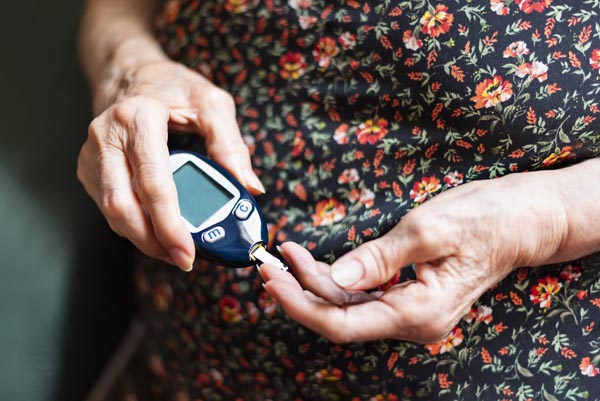Diabetes Care – In Home Specialty Care and Support for Diabetes Patients
 In 2013, 29.1 million Americans or 9.3 % of the population had diabetes. The percentage of Americans age 65 and older remains high, at 25.9 % or 11.8 million seniors. When someone has diabetes, either the pancreas is not producing enough insulin or the body is unable to use the insulin produced. Insulin’s job is to control the use and distribution of sugar in our bodies. When insulin cannot do its job correctly, the sugar level in the blood becomes too high.
In 2013, 29.1 million Americans or 9.3 % of the population had diabetes. The percentage of Americans age 65 and older remains high, at 25.9 % or 11.8 million seniors. When someone has diabetes, either the pancreas is not producing enough insulin or the body is unable to use the insulin produced. Insulin’s job is to control the use and distribution of sugar in our bodies. When insulin cannot do its job correctly, the sugar level in the blood becomes too high.
A very important key fact to remember is that patients with diabetes have a much slower healing time that is directly related to poor circulation.
There are several types of diabetes:
- Brittle – unpredictable changes in the client’s glucose tolerance.
- Insipidus – there is an inadequate amount of an antidiuretic hormone that causes excessive urination and thirst. This is more common in younger people.
- Juvenile-onset – diabetes which has its onset prior to the age of 25 years. This form is usually quite difficult to regulate.
- Latent – diabetes mellitus that happens during times of stress such as pregnancy, infectious disease, obesity, or trauma. Prior to any of these reasons, there are no symptoms or laboratory findings to indicate diabetes. There is a strong chance that these individuals will develop diabetes mellitus.
- Mellitus – a disorder of carbohydrate metabolism characterized by hyperglycemia (too much sugar in the blood) resulting from inadequate production or utilization of insulin.
- Pancreatic – diabetes associated with disease of the pancreas.
- Renal – a condition characterized by a low renal threshold for sugar.
Your Trusted Source for Specialty Home Care Services for Diabetes Patients
The two most common types of diabetes are:
Insulin-dependent diabetes mellitus (IDDM) – this type is also referred to as Type I. Little or no insulin is secreted. People with this kind of diabetes require insulin injections to stay alive.
Non-insulin-dependent diabetes mellitus (NIDDM) – also referred to as Type II. There may be a defect in the release of insulin, but most commonly there is conflict in the action of insulin in the tissues. This type usually develops after age 40 but may be seen in obese children. 80% of NIDDM are obese. This type is almost exclusively hereditary. The onset may be prevented or postponed by calorie restriction and weight loss.
Signs and Symptoms of Diabetes can include:
Type I
- Excessive urination
- Excessive thirst
- Excessive eating
- Weight loss
- Weakness and fatigue
Type II (same as Type I plus)
- Slow healing
- Blurred vision
- Cramps in legs/feet
- Itching
- Drowsiness
Your Trusted Source for Specialty Home Care Services for Diabetes Patients
Caregiving Experts offers Diabetes Home Care and In Home Health Care and Support for patients with Diabetes throughout Wayne and Oakland Coulties including Plymouth, Northville, Canton, Livonia, Westland, Novi, Farmington, Farmington Hills, Dearborn, Dearborn Heights, and the Downriver area.

